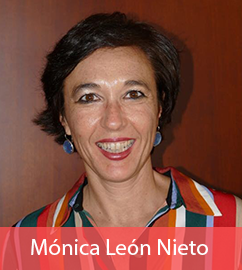MEET THE SPEAKERS
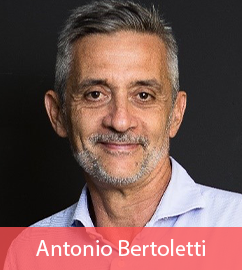

Antonio Bertoletti
 Antonio Bertoletti, MD is an expert in the field of viral hepatitis, with a specific interest in the immunopathogenesis of HBV infection. He began working in viral hepatitis at the University of Parma (Italy). During his MD specialization (1991) in Infectious Diseases he spent two years at The Scripps Research Institute (La Jolla) characterizing for the first time the Hepatitis B virus (HBV) specific cytotoxic T cell response in man. He returned to the University of Parma, where he worked in the Department of Infectious Diseases until 1997 before accepting a position of Senior Lecturer at “The UCL Institute of Hepatology” at University College of London (UK) (1997).
Antonio Bertoletti, MD is an expert in the field of viral hepatitis, with a specific interest in the immunopathogenesis of HBV infection. He began working in viral hepatitis at the University of Parma (Italy). During his MD specialization (1991) in Infectious Diseases he spent two years at The Scripps Research Institute (La Jolla) characterizing for the first time the Hepatitis B virus (HBV) specific cytotoxic T cell response in man. He returned to the University of Parma, where he worked in the Department of Infectious Diseases until 1997 before accepting a position of Senior Lecturer at “The UCL Institute of Hepatology” at University College of London (UK) (1997). In 2006 he moved to Singapore where he was the Director of Infection and Immunity Program at the Singapore Institute for Clinical Sciences (A*STAR) until 2013 before moving, as Full Professor, at the Emerging Viral Disease Program at Duke-NUS Medical School.
In 2015 he founded Lion TCR Pte (http://liontcr.com), a biotech company developing immune-based treatments for virus-related cancers (HBV-HCC and EBV related malignancies) and chronic viral infections.
His current research is focus on the development of new immunological based therapies (TCR-redirected T cells) for the treatment of HBV chronic infection and Hepatocellular carcinoma. In 2020, after the start of the COVID-19 pandemic, his laboratory has been actively involved in the characterization of SARS-COV2 specific T cell immune response.
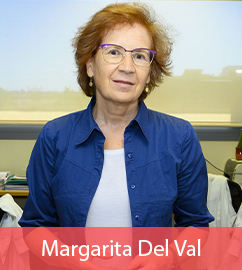

Margarita Del Val
 Margarita Del Val studied chemistry at Universidad Autónoma de Madrid and trained in virology and molecular biology at Centro de Biología Molecular (CSIC-UAM) in Madrid. She moved into viral immunology in Germany first, and further developed it at Instituto de Salud Carlos III and again at CBMSO. Her research focuses on understanding how the immune system controls virus infections in vivo, with a focus on vaccine improvement through understanding basic immunologic mechanisms of cellular immunity. She is a member of the Royal National Academy of Pharmacy, the Madrid Vaccines Advisory Team, and worked as external adviser for the European Medicines Agency. She heads the Spanish CSIC Interdisciplinary Research Platform on Global Health for fighting the SARS2 coronavirus pandemic. As the pandemic stroke, this background pushed her into front line science dissemination, for which she was awarded the FBBVA-CSIC prize and the UIMP Social Values Medal.
Margarita Del Val studied chemistry at Universidad Autónoma de Madrid and trained in virology and molecular biology at Centro de Biología Molecular (CSIC-UAM) in Madrid. She moved into viral immunology in Germany first, and further developed it at Instituto de Salud Carlos III and again at CBMSO. Her research focuses on understanding how the immune system controls virus infections in vivo, with a focus on vaccine improvement through understanding basic immunologic mechanisms of cellular immunity. She is a member of the Royal National Academy of Pharmacy, the Madrid Vaccines Advisory Team, and worked as external adviser for the European Medicines Agency. She heads the Spanish CSIC Interdisciplinary Research Platform on Global Health for fighting the SARS2 coronavirus pandemic. As the pandemic stroke, this background pushed her into front line science dissemination, for which she was awarded the FBBVA-CSIC prize and the UIMP Social Values Medal.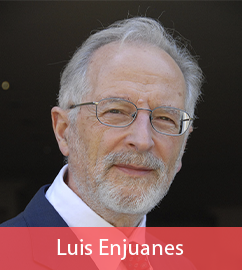

Luis Enjuanes
 Luis Enjuanes has been working in the virology field for more than 40 years, including 36 years in coronaviruses. His present interest is the study of the mechanism of replication, transcription, virulence and virus-host interaction in coronavirus. He has published more than 240 peer reviewed articles and 65 book chapters. At present, he is Research Professor and Head of the Coronavirus Laboratory at the National Center of Biotechnology of the Spanish National Research Council (CNB-CSIC). He has been an NIH Fogarty Visiting Fellow at Bethesda, MD, and a Visiting Scientist at FCRC, NIH, MD. He is Professor of Virology at the University of Madrid and the Institute Pasteur of Paris. He has been named “Distinguish Senior Virologist” by the Spanish Society of Virology, and a Member of the Royal Academy of Exact, Physical and Natural Sciences of Spain. He is also a member of the American Academy of Microbiology, and an International member of the National Academy of Sciences of USA. He has been awarded the Medal to Merit in Research and University Education by the Government of Spain. He has been Editor-in-Chief of Virus Research.
Luis Enjuanes has been working in the virology field for more than 40 years, including 36 years in coronaviruses. His present interest is the study of the mechanism of replication, transcription, virulence and virus-host interaction in coronavirus. He has published more than 240 peer reviewed articles and 65 book chapters. At present, he is Research Professor and Head of the Coronavirus Laboratory at the National Center of Biotechnology of the Spanish National Research Council (CNB-CSIC). He has been an NIH Fogarty Visiting Fellow at Bethesda, MD, and a Visiting Scientist at FCRC, NIH, MD. He is Professor of Virology at the University of Madrid and the Institute Pasteur of Paris. He has been named “Distinguish Senior Virologist” by the Spanish Society of Virology, and a Member of the Royal Academy of Exact, Physical and Natural Sciences of Spain. He is also a member of the American Academy of Microbiology, and an International member of the National Academy of Sciences of USA. He has been awarded the Medal to Merit in Research and University Education by the Government of Spain. He has been Editor-in-Chief of Virus Research.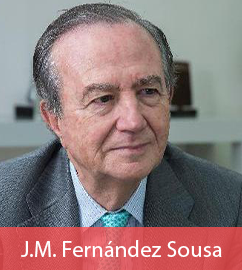

Jose María Fernández Sousa
 In 1967 he graduated in Chemical Sciences and obtained his PhD in Bio-chemical Sciences in 1971 from the Complutense University, Madrid. Between 1971 and 1979 he worked first as Assistant Professor, Associate Professor, Principal Lecturer and finally as Professor and Chair in Biochemistry at the Complutense University of Madrid and the University of Santiago de Compostela.
In 1967 he graduated in Chemical Sciences and obtained his PhD in Bio-chemical Sciences in 1971 from the Complutense University, Madrid. Between 1971 and 1979 he worked first as Assistant Professor, Associate Professor, Principal Lecturer and finally as Professor and Chair in Biochemistry at the Complutense University of Madrid and the University of Santiago de Compostela. He also holds an MBA in Business Management from the IESE Business School in Madrid.
Between 1967 and 1979 he worked in the following institutions. Research Laboratories at the ICI Pharmaceuticals Division, (Alderly Edge, UK), SHELL Laboratories, (Sittingbourne, UK), Laboratories of the Physikalish- Chemisches Institute at Basel University (Switzerland), the Department of Biological Chemistry at the Washington University of St. Louis (Missouri, USA), and at the Institute de Biologie Physico-Chemique, at the Edmond de Rothschild Foundation,( Paris, France).
Dr. Fernandez Sousa has over 100 publications and patents in the areas of biochemistry, antibiotics, anti-tumour drugs and molecular biology.
From 1979 to 1985 Dr. Fernandez-Sousa worked at Antibiotics, as Director of Research. During this period he was responsible for all the research projects and staff at Antibióticos, S.A.
He has been a member of the Board of Directors at Antibióticos, Penibérica, Biolys, ICI-Farma, Pescanova, Transfesa and Banco Guipuzcoano.
Since 1985 Dr. Fernández has been Chairman of the Board of Directors at Zeltia, (now Pharma Mar), in 1986 founding Pharma Mar, a biopharmaceutical company, world leader in the discovery and development of drugs of a marine origin. In 1990 he founded Genomica, a biotechnology company dedicated to DNA analysis, with applications in molecular diagnostics and forensic identification. He is Chairman of Genomica and Sylentis. He was President of ASEBIO from June 2008 until June 2011, and has been Chairman of the BANKINTER Foundation for innovation since April 2009. In 2001 he won the Ethical Businessman of the Year, award granted by the British magazine "the Economist" and the consulting firm Spencer Stuart. In 2009 he was invested Doctor Honoris Causa by the Antonio de Nebrija University and is the winner of the 2009 National Biotechnology Award.
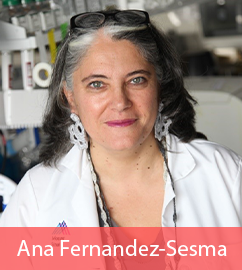

Ana Fernandez-Sesma
 Ana Fernandez-Sesma, PhD.
Ana Fernandez-Sesma, PhD.Dr. Fernandez-Sesma is currently a professor with tenure in the department of Microbiology at Icahn School of Medicine at Mount Sinai (ISMMS) in New York, NY, USA. She is interested on the modulation of innate immunity by viruses of human health interests, such as dengue (DENV), influenza (IAV), human immunodeficiency virus (HIV) and Zika (ZIKV) and more recently, also SARS-CoV-2. Her group uses mainly primary human systems, such as dendritic cells (DCs) and macrophages as well as primary lung epithelial cells and human tonsils for these studies combining molecular and immunological techniques. Their main goal is to understand the mechanisms of immune evasion used by these viruses to establish infection in humans. She currently participates in several multi-investigator projects on DENV and IAV that use OMICS technologies to study immune responses to infection. She has also participated in several study sections for the National Institutes of Health (NIH/NIAD) and is currently a member of the Scientific Council of the Division of Microbiology and Infectious Diseases (DMID) at NIH/NIAID. Dr. Fernandez-Sesma is also the Chair of the NIAID Human Immunology Project Consortium (HIPC) Steering Committee. Dr. Fernandez-Sesma is also very dedicated to graduate education and mentoring. She co-directed the Microbiology Main Training Area of the Graduate School of Biomedical Sciences at ISMMS from 2010 to 2020. She has co-authored numerous publications in Virology and Immunology journals and is on the editorial board of Journal of Virology, mSphere and PLoS Pathogens. In 2021 she was elected Fellow of the American Academy of Microbiology (AAM) and was also awarded the Jacobi Medallion from ISMMS and elected as Honorary Member of the Alumni Association of the University of Salamanca, Spain.
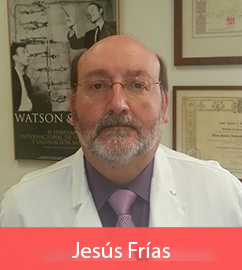

Jesús Antonio Frías Iniesta

Dr. Jesús Antonio Frías Iniesta is the Head of the Clinical Pharmacology Service in the Hospital Universitario La Paz (HULP), Director of the Clinical Pharmacology Research Group of IdiPAZ and Director of the Research and Clinical Trials Unit of the HULP ( integrated in SCReN). He is Professor of the Department of Pharmacology and Therapeutics of the Faculty of Medicine of the Universidad Autonoma de Madrid (UAM) and Director of the Phase I Clinical Trials Unit of the UAM. His main line of research focuses on the evaluation of the factors that determine the variability in the pharmacokinetics / clinical response and on the validation and implementation of pharmacokinetic and pharmacogenetic markers for therapeutic individualization. He has extensive experience in clinical research having participated as a researcher in more than 100 clinical trials and as PI in thirty clinical trials with pharmacokinetic and pharmacogenomic objectives with different drugs including antidepressants, antipsychotics, antibiotics, acenocoumarol, and immunosuppressants. Is responsible for the nine editions of the course of good clinical practice for researchers of the UAM, and director of “ Cátedra UAM-ABBVIE de Investigación Clínica”. National coordinator of the Spanish Clinical Research Network (SCReN) and author in more than 100 articles published in indexed journals
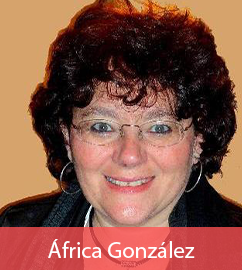

África González Fernández
 Prof. África González-Fernández (MD, PhD, Immunologist) was born in Madrid (Spain) and studied Medicine and Surgery in the University of Alcalá de Henares (Madrid, Spain) with special honours. She obtained her PhD in the same University and performed the speciality in Immunology as Medical Internal resident (4 years) at the Hospital Puerta de Hierro (Madrid). She spent 4 years as post doc with Dr. Cesar Milstein (Nobel Prize winner for the monoclonal antibody technology) in the Laboratory of Molecular Biology-Medical Research Council (LMB-MRC) in Cambridge (UK). She returned to Spain becoming Full Professor of Immunology in the University of Vigo (Spain). She is leading a research group in the field of immune response to vaccines, Nanomedicine, toxicity and immunogenicity to nanomaterials. She was Director of the Biomedical Research Center (CINBIO) in the University of Vigo (2009-2019), considered an excellent center by Xunta de Galicia. She was the former President of the Spanish society for Immunology (2016-2020). She has published over 180 papers and book chapters, some of them in very top journals such as Nature, Nature Nanotechnology, Cell, ACS-Nano, PNAS. She is regularly invited to give conferences in several international and national congresses, workshops. She developed 4 patents and is co-promoter of the spin-off company called “NanoImmunoTech” (2009- currently). She has been nominated for the EU women innovator Prize (2017), is member of Editorial Boards, and coordinator of institutional EU projects, and summer schools. She is very active in media, press, TV, radio about the COVID pandemic
Prof. África González-Fernández (MD, PhD, Immunologist) was born in Madrid (Spain) and studied Medicine and Surgery in the University of Alcalá de Henares (Madrid, Spain) with special honours. She obtained her PhD in the same University and performed the speciality in Immunology as Medical Internal resident (4 years) at the Hospital Puerta de Hierro (Madrid). She spent 4 years as post doc with Dr. Cesar Milstein (Nobel Prize winner for the monoclonal antibody technology) in the Laboratory of Molecular Biology-Medical Research Council (LMB-MRC) in Cambridge (UK). She returned to Spain becoming Full Professor of Immunology in the University of Vigo (Spain). She is leading a research group in the field of immune response to vaccines, Nanomedicine, toxicity and immunogenicity to nanomaterials. She was Director of the Biomedical Research Center (CINBIO) in the University of Vigo (2009-2019), considered an excellent center by Xunta de Galicia. She was the former President of the Spanish society for Immunology (2016-2020). She has published over 180 papers and book chapters, some of them in very top journals such as Nature, Nature Nanotechnology, Cell, ACS-Nano, PNAS. She is regularly invited to give conferences in several international and national congresses, workshops. She developed 4 patents and is co-promoter of the spin-off company called “NanoImmunoTech” (2009- currently). She has been nominated for the EU women innovator Prize (2017), is member of Editorial Boards, and coordinator of institutional EU projects, and summer schools. She is very active in media, press, TV, radio about the COVID pandemic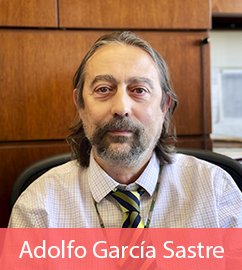

Adolfo García Sastre

Dr. García-Sastre is Professor in the Departments of Microbiology and Medicine and in the Tisch Cancer Center at Icahn School of Medicine Mount Sinai (ISMMS) in New York. He is also Director of the Global Health and Emerging Pathogens Institute at ISMMS, and Principal Investigator for the Center for Research on Influenza Pathogenesis and Transmission (CRIPT), a NIAID Center of Excellence for Influenza Research and Response (CEIRR). For the past 30 years, his research interest has been focused on the molecular biology, virus-host interactions, innate immunity and pathogenesis of influenza viruses and several other RNA viruses, as well as on the development of new vaccines and antivirals. He has more than 600 peer-reviewed publications in these areas of research. He has been President of the International Society for Vaccines in 2014-2015. He is Editor for the scientific journal PLoS Pathogens , Editor-in-Chief for Current Opinion in Virology, and has been editor for Journal of Experimental Medicine, Journal of Virology and Virus Research. In 2017, he has been elected a fellow of the Royal Academy of Pharmacy in Spain. In 2019, he was recognized with a Honorary Doctor Degree from the University of Burgos, Spain. Also in 2019, he was elected a member of the National Academy of Sciences and of the National Academy of Inventors.
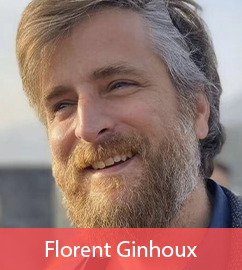

Florent Ginhoux
 Florent Ginhoux obtained his PhD in 2004 from the University Pierre et Marie CURIE, Paris VI. As a postdoctoral fellow, he joined the Laboratory of Miriam Merad in the Mount Sinai School of Medicine (MSSM), New York where he studied the ontogeny and the homeostasis of cutaneous dendritic cell populations, with a strong focus on Langerhans cells and Microglia. In 2008, he became an Assistant Professor in the Department of Gene and Cell Medicine, MSSM and member of the Immunology Institute of MSSM. He joined the Singapore Immunology Network (SIgN), A*STAR in May 2009 as a Principal Investigator. He is a Web of Science Highly Cited Researcher since 2016. He is also an Adjunct Visiting Associate Professor in the Shanghai Immunology Institute, Jiao Tong University, in Shanghai, China since 2015 as well as Adjunct Associate Professor in the Translational Immunology Institute, SingHealth and Duke NUS, Singapore since 2018. He is also starting a new laboratory focusing on pediatric cancers in the INSERM unit 1015 in Gustave Roussy Hospital, Villejuif, France.
Florent Ginhoux obtained his PhD in 2004 from the University Pierre et Marie CURIE, Paris VI. As a postdoctoral fellow, he joined the Laboratory of Miriam Merad in the Mount Sinai School of Medicine (MSSM), New York where he studied the ontogeny and the homeostasis of cutaneous dendritic cell populations, with a strong focus on Langerhans cells and Microglia. In 2008, he became an Assistant Professor in the Department of Gene and Cell Medicine, MSSM and member of the Immunology Institute of MSSM. He joined the Singapore Immunology Network (SIgN), A*STAR in May 2009 as a Principal Investigator. He is a Web of Science Highly Cited Researcher since 2016. He is also an Adjunct Visiting Associate Professor in the Shanghai Immunology Institute, Jiao Tong University, in Shanghai, China since 2015 as well as Adjunct Associate Professor in the Translational Immunology Institute, SingHealth and Duke NUS, Singapore since 2018. He is also starting a new laboratory focusing on pediatric cancers in the INSERM unit 1015 in Gustave Roussy Hospital, Villejuif, France.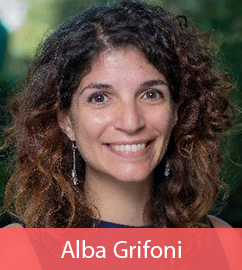

Alba Grifoni

Alba Grifoni
“Throughout my career, my main interest has been to study how HLA-molecules shape viral-specific immune responses. I am currently instructor/research faculty position at the La Jolla Institute for Immunology (LJI) in the Sette lab since 2020. My work combines experimental and computational predictive approaches and is focused on studying coronavirus-specific T cell responses, with particular emphasis on SARS-CoV-2, and related variants of concern (VOCs). Overall, I have co-authored 89 peer-reviewed publications and I was first or last author for 23 of them. These publications have resulted in more than 6,800 citations, an h-index score of 24, and an i-10-index of 49.”
“Throughout my career, my main interest has been to study how HLA-molecules shape viral-specific immune responses. I am currently instructor/research faculty position at the La Jolla Institute for Immunology (LJI) in the Sette lab since 2020. My work combines experimental and computational predictive approaches and is focused on studying coronavirus-specific T cell responses, with particular emphasis on SARS-CoV-2, and related variants of concern (VOCs). Overall, I have co-authored 89 peer-reviewed publications and I was first or last author for 23 of them. These publications have resulted in more than 6,800 citations, an h-index score of 24, and an i-10-index of 49.”


Stefano Lo Priore
 Stefano Lo Priore
Stefano Lo Priore Dr. Lo Priore is the founder and CEO of Hyris, and has been leading the company since its launch in 2014 through its startup phase and its recent explosive growth.
Hyris is an innovation-based biotechnology company which offers its partners and clients a disruptive system that enables genetic testing of biological samples in any setting, at any time, with real-time access to results on its dedicated AI-powered software platform.
He has 3 decades of experience in various technology fields, including biotechnology, microfluidics, semiconductors and software solutions, working in the US and Europe.
Prior assignments include a 16 years tenure at ST Microelectronics, global leader in semiconductor technologies, devices, and innovative industrial solutions, where he launched the biomedical business of the corporation out of San Diego, CA.
Dr Lo Priore holds various US and international patents, including the foundational ones of the Hyris System. He has done his undergratuate work at the University of the Pacific in Stockton, CA, and has received a Doctor in Industrial Chemistry from the State University of Milan and an MBA from the University of Texas at Dallas, TX.
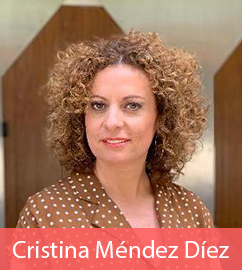

Cristina Méndez Díez

Cristina Méndez Díez, MD. Senior Medical Director Southern Europe. Pfizer Vaccines MDSCA, IDM
Dr. Cristina Méndez is the Senior Medical Director for Southern Europe at Pfizer Inc. since 2014, heading the vaccines medical team in this region. Dr. Mendez has extensive experience in the development, assessment and implementation of different national vaccination programs, among which the vaccination against COVID19, against pneumococcal disease and against meningococcal disease stands out. Dr. Mendez obtained a Bachelor’s degree in Medicine and Surgery from the University of Salamanca and the title of Specialist in Family Physician from the Principe de Asturias Hospital (Madrid) and is the author of more than 30 peer-review publications.
Dr. Cristina Méndez is the Senior Medical Director for Southern Europe at Pfizer Inc. since 2014, heading the vaccines medical team in this region. Dr. Mendez has extensive experience in the development, assessment and implementation of different national vaccination programs, among which the vaccination against COVID19, against pneumococcal disease and against meningococcal disease stands out. Dr. Mendez obtained a Bachelor’s degree in Medicine and Surgery from the University of Salamanca and the title of Specialist in Family Physician from the Principe de Asturias Hospital (Madrid) and is the author of more than 30 peer-review publications.
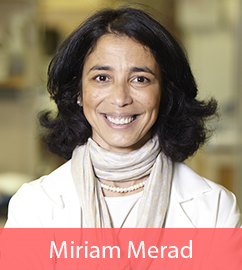

Miriam Merad
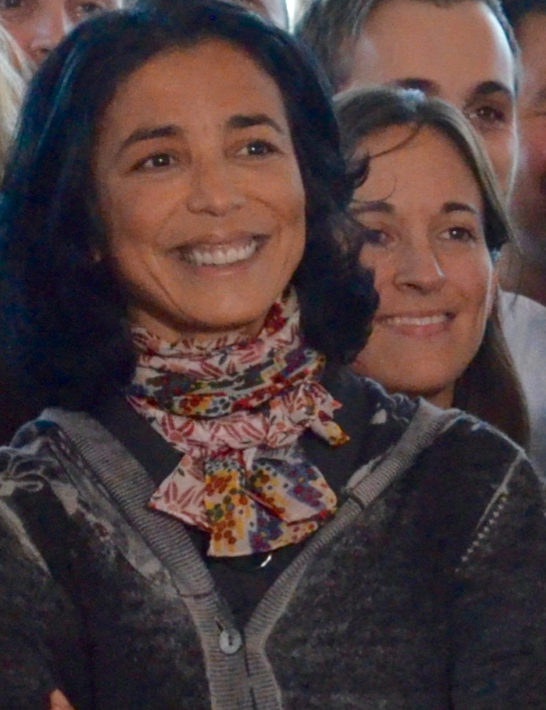
Miriam Merad, M.D.; Ph.D. is the Director of the Precision Immunology Institute at Mount Sinai School of Medicine in New York and the Director of the Mount Sinai Human Immune Monitoring Center (HIMC).
Dr. Merad is an internationally acclaimed physician-scientist and a leader in the fields of dendritic cell and macrophage biology with a focus on their contribution to human diseases. Dr. Merad identified the tissue resident macrophage lineage and revealed its distinct role in organ physiology and pathophysiology. She established the contribution of this macrophage lineage to cancer progression and inflammatory diseases and is now working on the development of novel macrophage-targeted therapies for these conditions. In addition to her work on macrophages, Dr. Merad is known for her work on dendritic cells, a group of cells that control adaptive immunity. She identified a new subset of dendritic cells, which is now considered a key target of antiviral and antitumor immunity.
Dr. Merad leads the Precision Immunology Institute at the Icahn School of Medicine (PrIISM) to bring immunology discoveries to the clinic. PrIISM integrates immunological research programs with synergistic expertise in biology, medicine, technology, physics, mathematics and computational biology to enhance our understanding of human immunology. She also founded the Human Immune Monitoring Center at Mount Sinai, one of the world’s most sophisticated research centers, which uses cutting-edge single-cell technology to understand the contribution of immune cells to major human diseases or treatment responses.
Dr. Merad has authored more than 200 primary papers and reviews in high profile journals. Her work has been cited several thousand times. She receives generous funding from the National Institutes of Health (NIH) for her research on innate immunity and their contribution to human disease, and belongs to several NIH consortia. She is an elected member of the American Society of Clinical Investigation and the recipient of the William B. Coley Award for Distinguished Research in Basic and Tumor Immunology. She is the President-elect of the International Union of Immunological Societies (IUIS). In 2020, she was elected to the National Academy of Sciences in recognition of her contributions to the field of immunology.
Dr. Merad is an internationally acclaimed physician-scientist and a leader in the fields of dendritic cell and macrophage biology with a focus on their contribution to human diseases. Dr. Merad identified the tissue resident macrophage lineage and revealed its distinct role in organ physiology and pathophysiology. She established the contribution of this macrophage lineage to cancer progression and inflammatory diseases and is now working on the development of novel macrophage-targeted therapies for these conditions. In addition to her work on macrophages, Dr. Merad is known for her work on dendritic cells, a group of cells that control adaptive immunity. She identified a new subset of dendritic cells, which is now considered a key target of antiviral and antitumor immunity.
Dr. Merad leads the Precision Immunology Institute at the Icahn School of Medicine (PrIISM) to bring immunology discoveries to the clinic. PrIISM integrates immunological research programs with synergistic expertise in biology, medicine, technology, physics, mathematics and computational biology to enhance our understanding of human immunology. She also founded the Human Immune Monitoring Center at Mount Sinai, one of the world’s most sophisticated research centers, which uses cutting-edge single-cell technology to understand the contribution of immune cells to major human diseases or treatment responses.
Dr. Merad has authored more than 200 primary papers and reviews in high profile journals. Her work has been cited several thousand times. She receives generous funding from the National Institutes of Health (NIH) for her research on innate immunity and their contribution to human disease, and belongs to several NIH consortia. She is an elected member of the American Society of Clinical Investigation and the recipient of the William B. Coley Award for Distinguished Research in Basic and Tumor Immunology. She is the President-elect of the International Union of Immunological Societies (IUIS). In 2020, she was elected to the National Academy of Sciences in recognition of her contributions to the field of immunology.
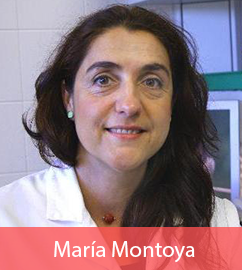

María Montoya González

Dr. María Montoya: I did my doctoral thesis at the Carlos III Health Institute in Madrid under the supervision of Dra. M del Val. My doctoral thesis focused on the limiting steps of the classical pathway of antigenic processing and presentation in viral infections. Later, I began to work as a postdoctoral scientific researcher in the group of Dr. P. Borrow and Dr. Tough at "The Edward Jenner Institute for Vaccine Research" (EJIVR) belonging to the University of Oxford in the United Kingdom. In this a center focused on vaccine design, where I made important scientific contributions on the role of dendritic cells in the context of viral infections.
In 2005, I began to lead my first research group at the “Center de Recerca en Sanitat Animal (CReSA)” in Barcelona where I dedicated myself to establishing a new line of research studying the interaction of the influenza virus with one of its natural hosts, the pig, although we also studied the infection in mice and ferrets. In addition, I designed new vaccination strategies. Similarly, we conducted crucial studies to understand the 2009 pandemic with the H1N1 Influenza virus. During this time, all the work was funded by several grants from the Spanish reseach system (AGL2006-13809-C03/GAN, AGL2009-12945-C02-01, AGL2010-22200-C02-01and AGL2013-48923-C2-2-R) where I was the PI and coordinator in all this grants. Also, I had other sources of national and international funding.
In 2014, I was offered a position as a viral immunologist leading a research group on Influenza and African swine fever viruses. I left the Spanish research system and I moved to The Pirbright Institute in the UK. The work was funded by grants from BBSRC. However, due to the Brexit situation, I moved back to Spain in 2018 when I obtained a permanent position at the CIB-CSIC. This position allowed me to return to the Spanish research system, enabeling to establish my research group again with diferent funding agencies as there is no figure in the Spanish research system fitting with my circumstances. So far the work is funded by collaborations and through the Interdisciplinary Global Health Thematic Platform on COVID.
The primary objectives of the research group are to study the mechanisms that control the relationships of RNA viruses with the host immune system. In the current pandemic, we were able to apply this accumulated experience to study various aspects of SARS-CoV-2, such as the mechanisms of inflammation or to design a vaccine based on protein S in CIB-CSIC.
I belong to the board of directors of the Spanish Society of Immunology (SEI), I coordinate the Master in Pandemics, Global Health and COVID at the Menéndez Pelayo International University and I am part of the coordination of the Interdisciplinary Global Health Thematic Platform with more than 300 research groups to fight the pandemic. I have published more than 90 scientific articles in high impact journals, as well as scientific books. I have participated in numerous national and international conferences as a guest speaker. I have generated 1 patent that is being developed by a company and I have formed a spin-off company (Innovex Therapeutics SL. Https://innovexther.com). I carry out science dissemination work to the general public outreaching in different media: TV, radio, press, podcast….My outreaching activities include giving scientific talks in schools/institutes. I am the vicepresident of the Gender and DIversity Task Force within the European Federation of Immunological Societies (EFIS) and I actively work to balance gender differences in the scientific field.
ORCID: 0000-0002-5703-7360
Researcher ID: G-3430-201
In 2005, I began to lead my first research group at the “Center de Recerca en Sanitat Animal (CReSA)” in Barcelona where I dedicated myself to establishing a new line of research studying the interaction of the influenza virus with one of its natural hosts, the pig, although we also studied the infection in mice and ferrets. In addition, I designed new vaccination strategies. Similarly, we conducted crucial studies to understand the 2009 pandemic with the H1N1 Influenza virus. During this time, all the work was funded by several grants from the Spanish reseach system (AGL2006-13809-C03/GAN, AGL2009-12945-C02-01, AGL2010-22200-C02-01and AGL2013-48923-C2-2-R) where I was the PI and coordinator in all this grants. Also, I had other sources of national and international funding.
In 2014, I was offered a position as a viral immunologist leading a research group on Influenza and African swine fever viruses. I left the Spanish research system and I moved to The Pirbright Institute in the UK. The work was funded by grants from BBSRC. However, due to the Brexit situation, I moved back to Spain in 2018 when I obtained a permanent position at the CIB-CSIC. This position allowed me to return to the Spanish research system, enabeling to establish my research group again with diferent funding agencies as there is no figure in the Spanish research system fitting with my circumstances. So far the work is funded by collaborations and through the Interdisciplinary Global Health Thematic Platform on COVID.
The primary objectives of the research group are to study the mechanisms that control the relationships of RNA viruses with the host immune system. In the current pandemic, we were able to apply this accumulated experience to study various aspects of SARS-CoV-2, such as the mechanisms of inflammation or to design a vaccine based on protein S in CIB-CSIC.
I belong to the board of directors of the Spanish Society of Immunology (SEI), I coordinate the Master in Pandemics, Global Health and COVID at the Menéndez Pelayo International University and I am part of the coordination of the Interdisciplinary Global Health Thematic Platform with more than 300 research groups to fight the pandemic. I have published more than 90 scientific articles in high impact journals, as well as scientific books. I have participated in numerous national and international conferences as a guest speaker. I have generated 1 patent that is being developed by a company and I have formed a spin-off company (Innovex Therapeutics SL. Https://innovexther.com). I carry out science dissemination work to the general public outreaching in different media: TV, radio, press, podcast….My outreaching activities include giving scientific talks in schools/institutes. I am the vicepresident of the Gender and DIversity Task Force within the European Federation of Immunological Societies (EFIS) and I actively work to balance gender differences in the scientific field.
ORCID: 0000-0002-5703-7360
Researcher ID: G-3430-201
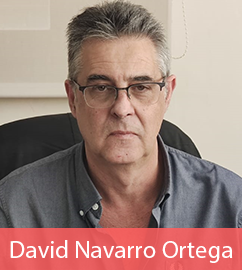

David Navarro Ortega

David Navarro graduated from Medical School at the University of Valencia (Spain) in 1985 and achieved his Doctor of Medicine degree in Microbiology and Immunology in the University of Valencia, Spain in 1989. He completed a postdoctoral research associate job (1989-1991) at the University of California San Francisco (UCSF).
He is currently Full Professor of Microbiology in School of Medicine of Valencia and Head of the Microbiology Service at the Clinic University Hospital, Valencia. His research activity mainly concerns diagnostic, clinical, biological and pathogenesis aspects of herpesvirus infections, especially cytomegalovirus in allogeneic stem-cell and solid organ transplant recipients, as well as in patients with inflammatory diseases and critically ill patients with no canonical immunosuppression and recently SARS-CoV-2.
He has authored or co-authored over 350 publications in intermediate-highly- ranked journals. He is Associate Editor of the Journal of Medical Virology, member of the Editorial Board of Diagnostic Microbiology and Infectious Diseases, member of the ECIL group of the European Bone Marrow Transplantation Society (EBMT) and regular reviewer for more than 30 journals.
He is currently Full Professor of Microbiology in School of Medicine of Valencia and Head of the Microbiology Service at the Clinic University Hospital, Valencia. His research activity mainly concerns diagnostic, clinical, biological and pathogenesis aspects of herpesvirus infections, especially cytomegalovirus in allogeneic stem-cell and solid organ transplant recipients, as well as in patients with inflammatory diseases and critically ill patients with no canonical immunosuppression and recently SARS-CoV-2.
He has authored or co-authored over 350 publications in intermediate-highly- ranked journals. He is Associate Editor of the Journal of Medical Virology, member of the Editorial Board of Diagnostic Microbiology and Infectious Diseases, member of the ECIL group of the European Bone Marrow Transplantation Society (EBMT) and regular reviewer for more than 30 journals.
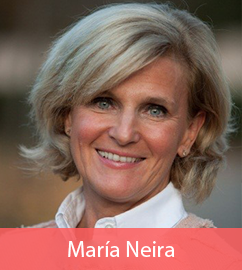

María P. Neira

Dr Maria P. Neira has been directing the Department of Environment, Climate Change and Health at the World Health Organization, Geneva, Switzerland since September 2005. Throughout her tenure and up until now she has led and advised on policy and management in key areas of environmental health. Prior to that she served as Under-Secretary of Health and President of the Spanish Food Safety Agency. From 1993-1998 she was Coordinator of the Global Task Force on Cholera Control. Dr Neira began her career as a medical coordinator working with refugees in El Salvador and Honduras for Médecins Sans Frontières (Doctors Without Borders). She then spent several years working in different African countries during armed conflicts. Born in the city of Oviedo, Asturias, Dr Neira is a Spanish national, a medical doctor by training and specialized in Endocrinology and Metabolic Diseases; and Public Health. Among many distinctions, she has been awarded the Médaille de l'Ordre national du Mérite by the Government of France and received an “Extraordinary Woman” award by HM Queen Letizia of Spain. In early 2019, she was nominated among the top 100 policy influencers in health and climate change.
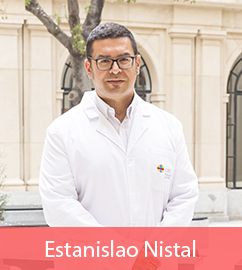

Estanislao Nistal Villán
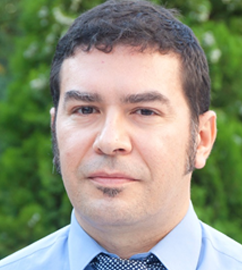
Twitter: @NistalVillan
Estanislao Nistal Villán, is from Toral de los Guzmanes, León. He obtained his Degree in Biochemistry from the University of Salamanca. In 2001 he began to work as a lab-manager in the Department of Microbiology of the Monte Sinai Hospital in New York, supporting the research of the 1918 Flu virus rescue project. In 2005 he began his PhD at the laboratory of Dr. Adolfo García-Sastre in the Department of Microbiology, focused on molecular characterization of mechanisms involved in the stimulation of interferon (IFN-β) in response to viral infections, especially the response to infection by influenza viruses. He complemented this study with the description of the structural repression of RIG-I, a main sensor protein involved in detecting viral infection in the laboratory of Professor Aneel Aggarwal, from the Department of Structural and Chemical Biology at Mount Sinai. In 2010 he began his postdoctoral studies at the CIMA in Pamplona, developing different models based on the regulation of IFN and the use of oncolytic viruses. Since 2015 he has been a professor in the Microbiology section of the Faculty of Pharmacy at CEU San Pablo University in Madrid and directs the Virology and Innate Immunity laboratory. The work of his current team focuses on the characterization of unconventional interferon induction mechanisms and innate immune response against infections. His main line of work focuses on the characterization of the immune response associated to influenza virus infections aggravated by bacterial infections in the context of trained immunity.
Website: https://scholar.google.com/citations?hl=en&user=IQM3DSwAAAAJ&view_op=list_works&sortby=pubdate
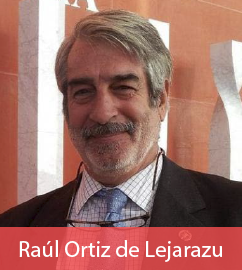

Raúl Ortíz de Lejarazu

Esta dirección de correo electrónico está siendo protegida contra los robots de spam. Necesita tener JavaScript habilitado para poder verlo. Twitter: @DrLejarazu
Raúl Ortiz de Lejarazu Leonardo, MD, PhD, is a Virologist, Doctor in Medicine and Surgery, specialist in Microbiology and Parasitology, as well as in Preventive Medicine and Public Health. Professor of Microbiology. He is now scientific advisor and Emeritus Director of the
National Influenza Centre of Valladolid, within the GISRS network of the WHO (Global Influenza Surveillance and Response System), Senior Consultant of Microbiology, Board member of the Vaccine Group and spokesperson for vaccines and respiratory infections of the SEIMC (Spanish Society of Infectious Diseases and Clinical Microbiology), he belongs to European RAISE Group
(Raising Awareness of Influenza Strategies in Europe).
Editor-in-chief of the book "Influenza viruses: pandemics, epidemics and vaccines"; first flu book written in Spanish by more than 40 Spanish virologists, epidemiologists, veterinarians and medical doctors. He has directed 30 doctoral theses and authored more than 300 scientific contributions (papers in journals, book chapters, monographs, etc), and speaker at national and international scientific meetings. His areas of interest include: Influenza and respiratory viral infections and other viruses, (HIV/AIDS, viral gastroenteritis and HPV) vaccines and emerging infections. He was until September first, 2019, Director of the Valladolid NIC (Global Influenza Surveillance & Response System, WHO), Head of Microbiology and Immunology Department at the Hospital Clínico Universitario in Valladolid and Professor of Microbiology at
the School of Medicine, University of Valladolid, Spain. The Spanish National Agency for Quality Assessment has accredited him five 6-years periods in active and continuous research.
National Influenza Centre of Valladolid, within the GISRS network of the WHO (Global Influenza Surveillance and Response System), Senior Consultant of Microbiology, Board member of the Vaccine Group and spokesperson for vaccines and respiratory infections of the SEIMC (Spanish Society of Infectious Diseases and Clinical Microbiology), he belongs to European RAISE Group
(Raising Awareness of Influenza Strategies in Europe).
Editor-in-chief of the book "Influenza viruses: pandemics, epidemics and vaccines"; first flu book written in Spanish by more than 40 Spanish virologists, epidemiologists, veterinarians and medical doctors. He has directed 30 doctoral theses and authored more than 300 scientific contributions (papers in journals, book chapters, monographs, etc), and speaker at national and international scientific meetings. His areas of interest include: Influenza and respiratory viral infections and other viruses, (HIV/AIDS, viral gastroenteritis and HPV) vaccines and emerging infections. He was until September first, 2019, Director of the Valladolid NIC (Global Influenza Surveillance & Response System, WHO), Head of Microbiology and Immunology Department at the Hospital Clínico Universitario in Valladolid and Professor of Microbiology at
the School of Medicine, University of Valladolid, Spain. The Spanish National Agency for Quality Assessment has accredited him five 6-years periods in active and continuous research.
Member of the Spanish Influenza Surveillance Group, of the EISS (European Influenza Surveillance Scheme), he was part of the Group of experts for the elaboration of Pandemic Influenza Plan and the National Committee for Pandemic Influenza (2001 to 2009), to the group of laboratories of the ECDC for Influenza and Respiratory viruses and the Advisory Committee for Ebola Virus Disease of Castilla y León (2014). Recognized as a visiting professor at the Faculty of Medicine of the Universidad de la Plata (Argentina 1997), he has the gold badge of the University of Valladolid (Spain 2002) and the recognition by the Regional Director of the WHO as one of the collaborating laboratories in the European eradication of polio (2008). Correspondent academic of the Royal Academy of Medicine of Valladolid. He belongs to various editorial committees of well-respected journals in his specialty.
Valladolid 17 November 2021


Zoi Pana
 Zoi is a Specialist in Pediatrics, Faculty Member at the European University Cyprus. She received her fellowship in Epidemiology, Infection Control and Antimicrobial Stewardship at the Johns Hopkins Hospital, Baltimore USA (HEIC Department, JHH). She holds two MSc, one in Medical Research and Methodology (AUTH, GR), and one in Nanotechnology (AUTH, GR) and a PhD in infectious diseases in immunocompromised children with leukemia. She has received the European Infectious Diseases Society ESPID Fellowship Award in 2017 and she is currently active Member of several European Committees and Expert Guideline Groups in infectious Diseases (ECIL8, ESPID, IPFN, ESCMID, C4C). She is reviewer in several international journals, and she has more than 50 publications. Zoi is a Scientific member of the COVID-19 National Committee at the Ministry of Health in Cyprus and Scientific Consultant of the Minister of Health. Zoi is representing Cyprus at the EU COVID-19 Scientific Advice platform under the auspices of the European Commission. Zoi is participating in several EU COVID-19 projects, and she is the National Coordinator for the new COVID-19 EU Horizon program VACCELERATE, the pan European Vaccine Trial Network. Zoi is additionally Work package Lead for the VACCELERATE Volunteer Registry.
Zoi is a Specialist in Pediatrics, Faculty Member at the European University Cyprus. She received her fellowship in Epidemiology, Infection Control and Antimicrobial Stewardship at the Johns Hopkins Hospital, Baltimore USA (HEIC Department, JHH). She holds two MSc, one in Medical Research and Methodology (AUTH, GR), and one in Nanotechnology (AUTH, GR) and a PhD in infectious diseases in immunocompromised children with leukemia. She has received the European Infectious Diseases Society ESPID Fellowship Award in 2017 and she is currently active Member of several European Committees and Expert Guideline Groups in infectious Diseases (ECIL8, ESPID, IPFN, ESCMID, C4C). She is reviewer in several international journals, and she has more than 50 publications. Zoi is a Scientific member of the COVID-19 National Committee at the Ministry of Health in Cyprus and Scientific Consultant of the Minister of Health. Zoi is representing Cyprus at the EU COVID-19 Scientific Advice platform under the auspices of the European Commission. Zoi is participating in several EU COVID-19 projects, and she is the National Coordinator for the new COVID-19 EU Horizon program VACCELERATE, the pan European Vaccine Trial Network. Zoi is additionally Work package Lead for the VACCELERATE Volunteer Registry.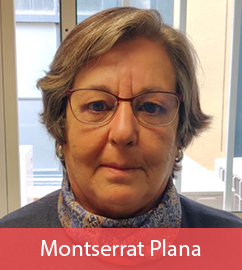

Montserrat Plana
 Montserrat Plana, MD, PhD, immunologist and accredited researcher (R3A) from IDIBAPS, is the leader of the immunopathology and cellular immunology group at the AIDS Research Group in Hospital Clinic-IDIBAPS. During the last 25 years, she has been involved in relevant studies of immunopathology of HIV infection and in the quantitative and qualitative characterization of HIV-specific T cell responses in the setting of therapeutic and preventive vaccine clinical trials. She also coordinates the Dendritic Cells studies (both DC ex-vivo model and the clinical-grade production of human DC). In fact, the AIDS Research Group from IDIBAPS is one of the group leaders in clinical trials in relation with HIV therapeutic vaccines and has developed the most promising therapeutic vaccine in the field performing the clinical trials to demonstrate its effectiveness and safety. Moreover, and during the last 5 years, the AIDS Research Group and more specially Dr. M. Plana´s team, has been also involved in different EU financed research proposal related to new approaches of therapeutic and preventive HIV vaccines which involve clinical trials as well as in more translational research testing in human dendritic cells model some novel RNA and viral immunogens for HIV and also for Flu (FP7/2007-2013 Grant agreement n° 602570 - HIVARNA; H2020 Grant agreement n° 681032 – EHVA; H2020-EU 3.1.3 Project ID:731626 – HIVACAR; EuroNanoMed II JTC 2016 – FluNanoAir). Moreover, she is also CoPI with Dr. Felipe García of a research proposal to develop a mRNA vaccine against SARS-CoV2 (COVARNA) financed last year by DGRIS-Generalitat de Catalunya and by FIS-ISCIII. Major significant research outputs: Scopus, total publications 132, citations 3482, h-index: 29
Montserrat Plana, MD, PhD, immunologist and accredited researcher (R3A) from IDIBAPS, is the leader of the immunopathology and cellular immunology group at the AIDS Research Group in Hospital Clinic-IDIBAPS. During the last 25 years, she has been involved in relevant studies of immunopathology of HIV infection and in the quantitative and qualitative characterization of HIV-specific T cell responses in the setting of therapeutic and preventive vaccine clinical trials. She also coordinates the Dendritic Cells studies (both DC ex-vivo model and the clinical-grade production of human DC). In fact, the AIDS Research Group from IDIBAPS is one of the group leaders in clinical trials in relation with HIV therapeutic vaccines and has developed the most promising therapeutic vaccine in the field performing the clinical trials to demonstrate its effectiveness and safety. Moreover, and during the last 5 years, the AIDS Research Group and more specially Dr. M. Plana´s team, has been also involved in different EU financed research proposal related to new approaches of therapeutic and preventive HIV vaccines which involve clinical trials as well as in more translational research testing in human dendritic cells model some novel RNA and viral immunogens for HIV and also for Flu (FP7/2007-2013 Grant agreement n° 602570 - HIVARNA; H2020 Grant agreement n° 681032 – EHVA; H2020-EU 3.1.3 Project ID:731626 – HIVACAR; EuroNanoMed II JTC 2016 – FluNanoAir). Moreover, she is also CoPI with Dr. Felipe García of a research proposal to develop a mRNA vaccine against SARS-CoV2 (COVARNA) financed last year by DGRIS-Generalitat de Catalunya and by FIS-ISCIII. Major significant research outputs: Scopus, total publications 132, citations 3482, h-index: 29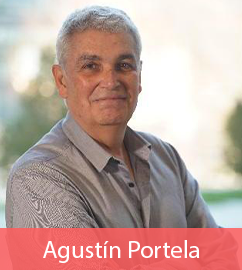

Agustín Portela

Current position and memberships:
- Head of the Unit dealing with clinical aspects for human vaccines in the Agencia Española de Medicamentos y Productos Sanitarios.
- Member of the “EMA vaccines Working Party”
- Member of the “COVID-19 EMA pandemic Task Force”.
- Member of the Spanish “National Immunization Technical Advisory Group (NITAG)” that advices on human vaccines immunization policy.
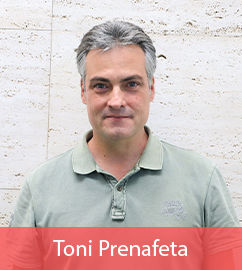

Toni Prenafeta
 Toni Prenafeta Amargós
Toni Prenafeta AmargósSenior Manager at R&D Department, HIPRA.
Toni Prenafeta graduated in Biology from the Universitat de Barcelona (UB, Spain) in 1994 and obtained his PhD from the same university in 1999. Between 1998 and 1999 he was substitute Associate Professor of Microbiology at the faculty of Biology, UB. In 2000, he joined to the R&D Department of HIPRA (Amer, Spain), where he has been involved in the development of vaccines for bovine (Startvac®, UBAC®) and human health (COVID-19 PHH-1V vaccine). Nowadays Toni is Senior Manager for the development of new vaccines in the R&D Department of HIPRA. He also participates as PhD director in the Universitat de Girona (Girona, Spain). He has co-authored several articles in international peer-reviewed journals, co-authored one patent, published a book chapter in bovine udder health and he has contributed to several national and international conferences.
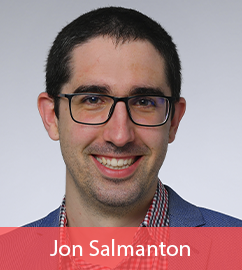

Jon Salmanton
 Dr. Jon Salmanton-García (Sodupe, 1990), PhD in Health Sciences by the University of Cologne (Cologne, Germany) is a postdoctoral researcher and project manager in the group of Prof. Dr. Oliver A. Cornely, Department I of Internal Medicine, University Hospital Cologne (Cologne, Germany). He did his PhD thesis on emerging invasive fungal infections, namely mucormycosis, and extremely rare invasive fungal infections within the FungiScope - Global Registry of Emerging Fungal Infections team (www.fungiscope.net). Currently, he is a member of the Coordination Office of the VACCELERATE Consortium, a pan European clinical research network for the coordination and conduction of COVID-19 vaccine trials (www.vaccelerate.eu), managing the EUVAP - European Vaccine Trial Accelerator Platform (www.euvap.eu), so as the VACCELERATE Volunteer Registry (www.vaccelerate.eu/volunteer-registry). In parallel, he also coordinates the EPICOVIDEHA survey - Epidemiology of COVID-19 infection in patients with hematological malignancies: A European Haematology Association Survey (www.ehaweb.org/covid-19/epicovideha-survey/). He has a special interest in registries and questionnaires, database management, invasive fungal infections and infectious diseases in general.
Dr. Jon Salmanton-García (Sodupe, 1990), PhD in Health Sciences by the University of Cologne (Cologne, Germany) is a postdoctoral researcher and project manager in the group of Prof. Dr. Oliver A. Cornely, Department I of Internal Medicine, University Hospital Cologne (Cologne, Germany). He did his PhD thesis on emerging invasive fungal infections, namely mucormycosis, and extremely rare invasive fungal infections within the FungiScope - Global Registry of Emerging Fungal Infections team (www.fungiscope.net). Currently, he is a member of the Coordination Office of the VACCELERATE Consortium, a pan European clinical research network for the coordination and conduction of COVID-19 vaccine trials (www.vaccelerate.eu), managing the EUVAP - European Vaccine Trial Accelerator Platform (www.euvap.eu), so as the VACCELERATE Volunteer Registry (www.vaccelerate.eu/volunteer-registry). In parallel, he also coordinates the EPICOVIDEHA survey - Epidemiology of COVID-19 infection in patients with hematological malignancies: A European Haematology Association Survey (www.ehaweb.org/covid-19/epicovideha-survey/). He has a special interest in registries and questionnaires, database management, invasive fungal infections and infectious diseases in general.Twitter: @SalmantonGarcia
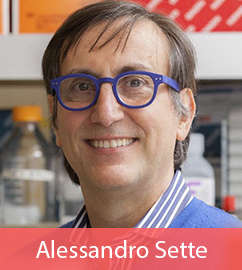

Alessandro Sette

Dr. Alessandro Sette has devoted more than 35 years of study towards understanding the immune response, measuring immune activity, and developing disease intervention strategies against cancer, autoimmunity, allergy, and infectious diseases. Dr. Sette is currently a Member and Head of the La Jolla Institute for Immunology (LJI) Division of Vaccine Discovery as well as chair of the Institute's Center for Infectious Diseases. Dr. Sette has a doctorate in Biological Sciences from the University of Rome and did postdoctoral work at the National Jewish Center for Immunology and Respiratory Medicine in Denver, Colorado. In 1988, Dr. Sette joined Howard Grey, M.D. at the newly founded Cytel, in La Jolla, and was also appointed as an adjunct assistant professor at The Scripps Research Institute. He founded Epimmune in 1997, where he served both as Vice President of Research and Chief Scientific Officer until 2002, when he joined LJI.
Dr. Sette is a leader in the field of T cell epitope-MHC interactions, beginning with his contribution to the discovery of the biological function of MHC in the mid 80s to mid 90s. From those studies he and his collaborators further developed the notion that different MHCs have distinct binding specificities that can be used to predict epitopes. The Sette group also discovered and characterized how MHC variants can be grouped according to broad common functional specificities (MHC supertypes), greatly facilitating epitope classification, characterization and understanding the basic rules of epitope-MHC interactions. At the same time, several studies have outlined the fine specificity of different closely related alleles, in some cases clearly associated with predisposition to disease resistance or susceptibility.
The laboratory is defining in chemical terms the specific structures (epitopes) that the immune system recognizes, and uses this knowledge to measure and to define the immune signatures associated with productive/protective immunity versus deficient immunity/immunopathology. The laboratory’s broad disease focus is ranges from HIV, HBV, HCV and emerging diseases to dengue viruses, malaria and tuberculosis.
Furthermore, Dr. Sette’s team has adapted the methods and techniques developed in the context of infectious disease to understand the T cell response to common allergens. These efforts have resulted in the discovery of previously unknown human T cell epitopes that may be key in the initiation of allergic responses, and to the development of biochemical and bioinformatic tools that have been used to map the human T cell response to a large panel of common allergens.
Finally, Dr. Sette has overseen the design and curation efforts of the national Immune Epitope Database (IEDB), a freely available, widely used bioinformatics resource, since its inception in the early 2000s. The IEDB catalogs all epitopes for humans, non-human primates, rodents, and other vertebrates, from allergens, infectious diseases, autoantigens and transplants, and includes epitope prediction tools to accelerate immunology research around the world.
Dr. Sette is a leader in the field of T cell epitope-MHC interactions, beginning with his contribution to the discovery of the biological function of MHC in the mid 80s to mid 90s. From those studies he and his collaborators further developed the notion that different MHCs have distinct binding specificities that can be used to predict epitopes. The Sette group also discovered and characterized how MHC variants can be grouped according to broad common functional specificities (MHC supertypes), greatly facilitating epitope classification, characterization and understanding the basic rules of epitope-MHC interactions. At the same time, several studies have outlined the fine specificity of different closely related alleles, in some cases clearly associated with predisposition to disease resistance or susceptibility.
The laboratory is defining in chemical terms the specific structures (epitopes) that the immune system recognizes, and uses this knowledge to measure and to define the immune signatures associated with productive/protective immunity versus deficient immunity/immunopathology. The laboratory’s broad disease focus is ranges from HIV, HBV, HCV and emerging diseases to dengue viruses, malaria and tuberculosis.
Furthermore, Dr. Sette’s team has adapted the methods and techniques developed in the context of infectious disease to understand the T cell response to common allergens. These efforts have resulted in the discovery of previously unknown human T cell epitopes that may be key in the initiation of allergic responses, and to the development of biochemical and bioinformatic tools that have been used to map the human T cell response to a large panel of common allergens.
Finally, Dr. Sette has overseen the design and curation efforts of the national Immune Epitope Database (IEDB), a freely available, widely used bioinformatics resource, since its inception in the early 2000s. The IEDB catalogs all epitopes for humans, non-human primates, rodents, and other vertebrates, from allergens, infectious diseases, autoantigens and transplants, and includes epitope prediction tools to accelerate immunology research around the world.
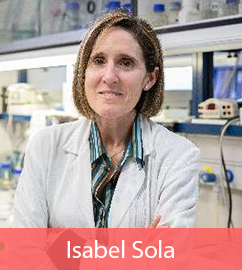

Isabel Sola

Isabel Sola received her PhD in Molecular Biology from the University Autonoma of Madrid (1997). Since then, she has been working in Coronaviruses (CoV) for more than 25 years at the National Center for Biotechnology, in the Spanish National Research Council (CNB-CSIC). She is currently a research scientist and co-director with Dr. Luis Enjuanes of the Coronavirus Laboratory at CNB-CSIC, in Madrid. Her present interest is the study of the mechanisms of pathogenesis and virus-host interactions in highly virulent human respiratory CoVs, SARS-CoV, MERS-CoV and SARS-CoV-2, with special emphasis in virus antagonists of the innate immune response and non-coding RNAs. This knowledge is being applied to the development of RNA replicon-based vaccine candidates against SARS-CoV-2.
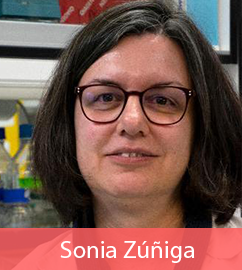

Sonia Zúñiga

Sonia Zúñiga (ORCID 0000-0003-2549-6826) is Staff Scientist in the Coronavirus Laboratory at the National Centre for Biotechnology (CNB-CSIC), Spain. Her research line is focused in the analysis of the molecular bases of coronavirus pathogenesis for the development of vaccine candidates and identification of novel therapeutic targets. After 20 years of experience, she made key contributions to the mechanism of coronavirus transcription, molecular mechanisms of innate immunity antagonism by viral proteins, engineering of reverse genetics systems for emergent coronaviruses, and development of vaccine candidates both for animal and human health. Sonia Zúñiga is member of the Spanish Society for Virology (SEV) and the European Society for Virology (ESV). She is the co-coordinator of the Vaccines sub-thematic in the “Global Health” Interdisciplinary Platform (PTI-SG) from CSIC. She is member of the Editorial Board of Virus Research, Helyion, Pathogens, Frontiers in Virology and Frontiers in Cellular and Infection Microbiology. She has participated in more than 33 funded projects and she is co-inventor in three patents. She has published 40 papers, 17 of them as first or senior author, with more than 1805 times cited and an h-index of 21. Sonia also collaborates in teaching and divulgation activities and has reviewer experience for both national and international funding agencies.

